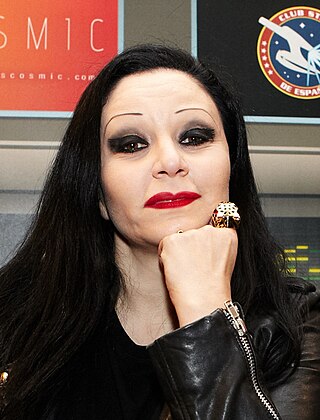
Carlos Alberto Vives Restrepo is a Colombian singer, songwriter and actor. He is known for his interpretation of traditional music styles of Colombia such as vallenato, cumbia, champeta, bambuco and porro as well as genres such as Latin pop, reggaeton, dance pop and tropical music.
Bronco is a Mexican grupero band from Apodaca, Nuevo León. Their modern take on regional Mexican music in the 1980s and 1990s helped earn them a number of international hits. Band members José Guadalupe Esparza, Ramiro Delgado, Javier Villareal and José Luis "Choche" Villareal crafted a sound that paid tribute to the norteño tradition while incorporating modern instruments like keyboards, as well as a more melodic, pop style with elaborate jumpsuits.
Magneto was a popular Mexican boy band of the 1980s and 1990s. The band formed on February 14, 1983. In 1986, Magneto was featured in "Siempre en Domingo," a Mexican entertainment show viewed across Latin America and parts of Europe. Mexican teen pop group Magneto emerged in 1983. Their first record, Dejalo Que Gire came in 1984, followed by Super 6 Magneto. The Latin pop outfit suffered several lineup changes before achieving their first gold record in 1986. Mostly playing dance-pop songs, the five-member ensemble started touring Central America after climbing charts with "Todo Esta Muy Bien," and "Soy Un Soñador." However, their breakthrough came after issuing a Spanish-language version of Desireless' "Voyage, voyage," a French pop hit from the '80s. In 1992 the boy band played the lead in their own movie, Cambiando el Destino. Magneto won the Lo Nuestro Award for Pop New Artist of the Year, and received two nominations for the Lo Nuestro Awards of 1993: Pop Album (Magneto) and Pop Group of the Year. Nevertheless, the original Magneto disbanded in 1996 after a sold-out show at Mexico City's Auditorio Nacional.

Vicente Amigo Girol is a Spanish flamenco composer and guitarist, born in Guadalcanal near Seville. He has played as an accompanying guitarist on recordings by flamenco singers Camarón de la Isla, and Luis de Córdoba, and he has acted as a producer for Remedios Amaya and José Mercé. His album Ciudad de las Ideas won the 2001 Latin Grammy for the Best Flamenco Album and the 2002 Ondas award for the best Flamenco work.

María Olvido Gara Jova, better known as Alaska, is a Spanish-Mexican singer famous in Spain and Hispanic America. She was one of the founding members of the La Movida Madrileña, the cultural and artistic movement that followed the end of Francoist Spain. This movement, in which music, the arts, cinema and fashion erupted and collided to show what Spain had become under Franco. She has participated, since the late 1970s, in several music groups: Kaka de Luxe 1977, Alaska y los Pegamoides 1980, Alaska y Dinarama 1983, and since 1989, the Spanish electropop band, Fangoria. Today, Alaska continues to perform and has become an icon of 1980s Spain.

Janette Anne Dimech, known professionally as Jeanette, is a Spanish singer. She first rose to prominence as the lead singer of Pic-Nic, a teenage folk-pop band that topped the charts in 1968 with her song "Cállate, niña". Jeanette returned as a solo artist in 1971 with the Hispavox single "Soy rebelde", which redefined her career as a romantic balladist and was a hit across the Spanish-speaking world, becoming a generational anthem.

Sasha Marianne Sökol Cuillery is a Mexican singer, composer, actress and television presenter.
Radio Futura was a Spanish pop rock group. They rose to become one of the most popular bands in Spain during the 1980s and early 1990s. In 1989 they were voted the best Spanish act of the 1980s.
Yuridia Valenzuela Canseco, commonly known as Yuri, is a Mexican singer, actress and television host. Yuri began her career as a teenage singer in her native country. In 1978 she released her first album titled Tú Iluminas mi Vida. She gained recognition as a result of her participation in the Oti Festival in 1980. In the 1980s and early 1990s, Yuri established herself as one of the most popular pop music singers in Mexico and Latin America. Her vocal quality and versatility allow her to be incorporated into other musical genres, ranging from pop to dance, ranchera and tropical music genres. Thanks to her success and influence, she came to be considered the "Queen of Latin Pop".

Rosendo Mercado Ruiz is a Spanish rock singer and songwriter. He was a member of bands Ñu and Leño, and is a prominent exponent of the so-called urban rock in Spain.
Miguel Blasco is a music producer and songwriter. Born in Spain.

José María Sanz Beltrán, Loquillo or Loco is a Spanish rock singer. He was born in Barcelona. Beginning in the 1980s, he performed as Teddy Loquillo, and then with the groups Loquillo y los Intocables, and later Loquillo y Los Trogloditas. He started out as a rockabilly artist, and then became more famous mixing pop, punk and rock. He played as a solo act as well as performing with the Trogloditas, but they broke up in 2008. Nowadays, he's a widely recognised solo artist in Spain. He also writes blogs on elmundo.es.

Myriam Raquel Hernández Navarro is a Chilean singer, songwriter and television presenter. She has dabbled mainly in romantic ballad, which is why she is sometimes nicknamed "La baladista de América", although she has also fused her style with other genres such as electronics or hip-hop.

Timbiriche VII is the seventh studio album by Mexican pop group Timbiriche, released on June 29, 1987, by Fonovisa Records. This album marked the beginning of Thalía Sodi's participation in the group and in the same year she also appeared on the Televisa production, Quinceañera.

Swing en tu Idioma is the 17th studio album by Mexican pop singer Mijares. It's a collection of greatest hits of another singers of the Spanish rock genre, in the American swing style.

Antonio Vega Tallés was a Spanish pop singer-songwriter.

Héctor Omar Hoffmann Fenzel, better known as Sergio Denis was an Argentine singer-songwriter and occasional actor.

Los Secretos are a Spanish rock band founded in Madrid in 1978 and often associated with the movida madrileña movement.
Hispavox S.A. was a major Spanish record company founded on June 27, 1953, that run independently until 1985 when it was acquired by EMI. Their studios were located in Madrid, and were known among fans as Sonido Torrelaguna. EMI owned the Hispavox record label, manufactured for other labels and distributed in Spain foreign labels. The Hispavox name is retained by Warner Music Group after its acquisition of Parlophone Music Spain in 2013.













